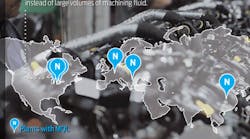Near-Dry Machining Helps Ford Motor Cut Water and Oil Use in its Factories
Ford Motor Co. has implemented dry machining at six of its plants around the world, and the automaker says that number will double over the next few years.
Near-dry machining, also known as minimum-quantity lubrication or MQL, is a process that lubricates cutting tools with a fine spray of oil exactly when and where it is needed. In comparison, conventional wet machining floods the part with metalworking fluids, requiring large amounts of fluid to cool and lubricate the tools used to make engines and transmissions.
For a typical production line, MQL can save more than 280,000 gallons of water per year, or enough to fill 5,600 average-size bathtubs, according to Ford.
The automaker noted that its Cologne Engine Plant in Germany decreased water use per engine by 50 percent from 2011 to 2012 by switching to the MQL process.
"Reducing the environmental footprint of our plants is a critical part of Ford's overall sustainability commitment," said Andrew Hobbs, director of Ford's environmental quality office. "Expanding new processes such as MQL across our global network of facilities allows us to have an even greater impact."
MQL also reduces the amount of oil needed to machine an engine or transmission by 80 percent or more, to approximately 100 milliliters – or about half the size of an average drinking glass, according to the automaker.
Without the need for a coolant system across most engine-production lines, MQL also helps to reduce energy use. While conventional wet machining produces an airborne mist, MQL eliminates that mist, improving air quality in the plant.
Three Ford plants in Michigan have shifted to the MQL process, along one plant in China, one in Germany and one in Romania.
"MQL technology also will be incorporated into future engine and transmission plants, underscoring our commitment to advanced manufacturing processes that reduce water and resource requirements," said Bill Russo, director of manufacturing for Ford powertrain operations.
One of Ford's sustainability goals is to reduce water use by 30 percent per vehicle by 2015. Between 2000 and 2012, the automaker cut global water use by 62 percent – about 10 billion gallons.
